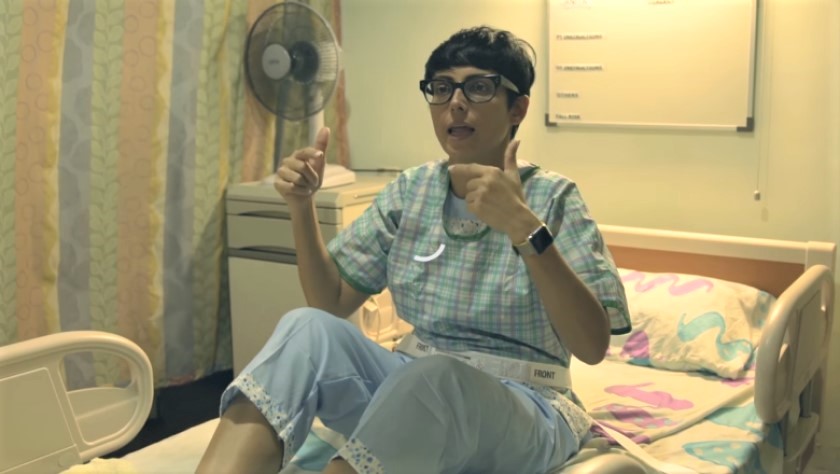Professional caregivers and family caregivers perform vital functions that often go unrewarded. As a society we must take steps to ensure caregiving is recognized, rewarded, and compensated appropriately. We’re all growing older and unless we fix this, we’ll suffer the consequences.
Almost seven months ago I spent three nights in a residential care home. I stayed in memory care. Surprisingly, I fit right in! Anita Kapoor stayed two weeks. Highlights of her story are below with a video.
Anita’s Nursing Home Stay
Anita Kapoor, a young TV Presenter and Caregiver for her mom who suffered a stroke, spent two weeks as a resident in one of Singapore’s better nursing homes. Unlike my experience – the freedom to come and go – Anita went all in with the following hypothetical symptoms:
- Mild dementia
- Non-ambulatory (needs a wheelchair)
- Incontinent
- Falls
Her conditions required her to be restrained, bathed with assistance, to wear incontinence underwear, and when not sleeping, to sit in a wheelchair.

Anita anticipated a degree of dehumanization and inability to control her own schedule. The restraints and mitts brought her to tears.
Below are the highlights of Anita Kapoor’s nursing home stay.
Video below with timeline in brackets.
Day 1: Arrive in a wheelchair [3:25]
Anita feels small as she’s admitted in a wheelchair. She’s not in control.
A female staff member conducts the intake process with a full body check for bruises and other skin issues.
It’s weird to have your existence broken down to a bed, a bedside table, meals, interaction, and specific spaces.
At dinner, she feels self-conscious about being so young. She’s also concerned that no one has asked why she’s there. Her dinner mates help her feel welcome. Their unconditional acceptance brings her to tears. She wishes she could see more of this in the world.
8:00PM: Bedtime and Restraint [12:30]
She is fitted with a body jacket (“for your safety”) to prevent her from falling. It’s made of unbreathable material that makes her hot, sweaty, and uncomfortable.
Day 2: Lights on at 5:00AM!
A resident cries out in the distance. A care staff member comes in to check Anita’s vitals. Then it’s time for her morning shower.
Anita moves into the Dementia Ward. [21:45]
Anita needs a higher-level of care with these additional symptoms.
- Hearing loss in right ear
- Dysphagia (difficulty swallowing)
- Unable to sit up in the shower
- Excessive scratching
These required her to wear mitts, be bathed completely, eat “functional food,” and insert an earplug into her right ear.
Meaningful Connections [22:51]
One spirited resident engaged her with humor and she felt uplifted. Meanwhile, a gentleman cradled baby doll he regarded as his grandchild.
Night 2: Unable To Rest [28:40]
Six beds in one room. Noises. Sweltering heat and a non-breathable restraint.
Anita receives a complete bath. [30:40]
Anita feels vulnerable. When it’s done, she observes, “I was sluiced down like a pig… I don’t know how that experience could be nicer.”
Commentary on Food [34:30]
“Food is pleasure.”
“Functional food… It’s just slop… lacking in taste…lacking in texture.”
One Week Later [37:56]
“I am really tired. I hit the wall, already.”
“When people come to visit you it’s like an awakening… a lifeline. A visit… it’s kindness. You took time to be with me.”
Those mitts – “I think it’s horrible,” she says as she uses them to wipe her tears.
Day 12: A Highlight and Lowlight [45:14]
She’s sitting in a wheelchair along the wall wearing mitts and a restraint. Her awareness of time makes it more difficult to cope. “How long can you sit? I’m, already tired and it’s… nine in the morning.” She is spoon-fed.
“There are many wonderful people out there
who want to give care.”
In another room, she witnesses a resident whose daughter visits after a 20-year absence. Mom and daughter embrace. Mom tells her daughter, “I love you.” The daughter cries.
Anita’s Last Day [56:50]
She doesn’t want to say, “Goodbye” on her final day. In tears, she sums up her experience and that of the residents: This existence is limiting. She’s angry because, “This is us.”
She needs to see her mom. Two weeks is the longest she’s gone without seeing her mom.
The Future of Caregiving
Unless we have enough money to pay for more personal care, this is what we can expect. When society devalues caregivers’ physical, mental, and emotional care with barely livable wages, quality will decline.
Anita gives us an insider’s view of the importance of connections and visits. We are inspired to look at improvements in the little things that can make a big difference.
To raise the quality of care and leadership’s commitment to care staff, nursing home team members and their leaders need to live in a nursing home (with symptoms) for one week. Annually, a refresher of three days and two-nights will continue having a dramatic impact on middle- and bottom-line growth while reducing turnover and increasing the quality of care.
Anita notes toward at about the 63-minute mark that residents need meaning and purpose.
View the 67-minute video, below.
More information at: TV Host Who Lived For 2 Weeks In Nursing Home Films Her Experience by HelloCare – Journalist Team. Mar 1, 2018 [11/18/2025 TCV Update: URL no longer available]
Thank you to Daniel Kuhn for posting this to the Alzheimer’s & Professionals Group on LinkedIn. [Link not provided as unavailable to the general readership.]








